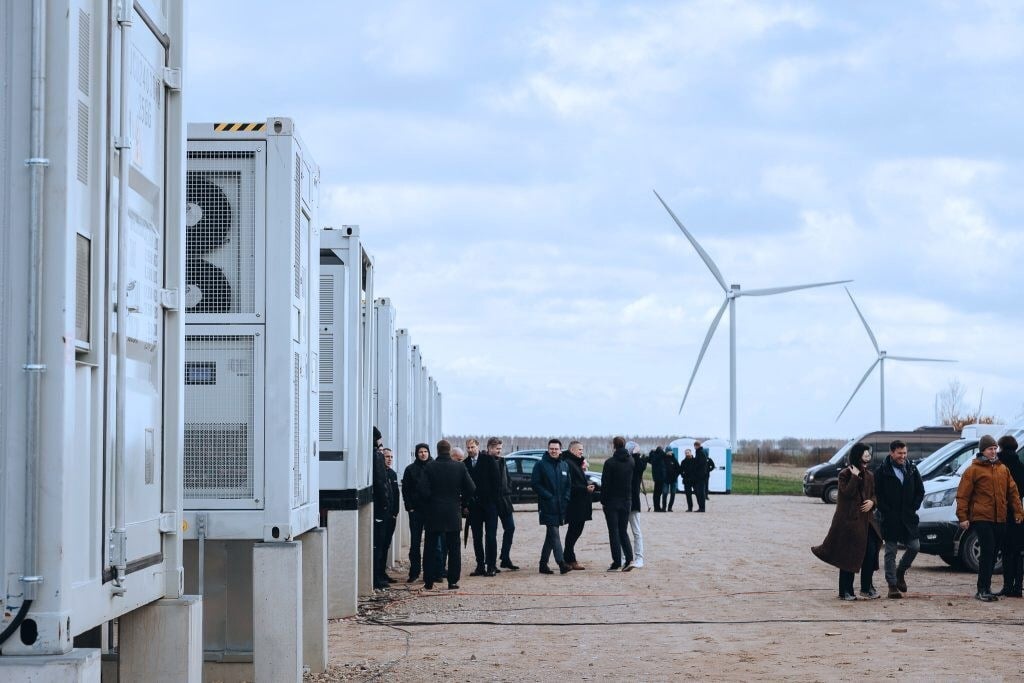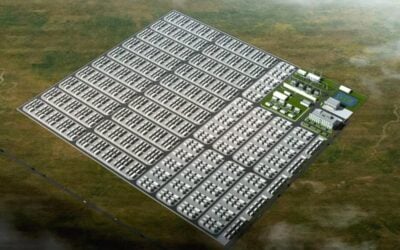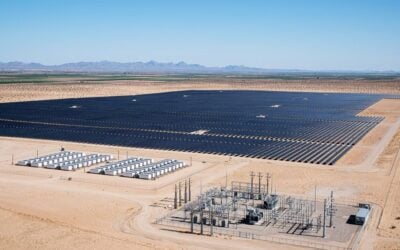
In news from Europe’s Baltic Sea region, Latvia’s first utility-scale battery storage project has been commissioned, while Fotowatio Renewable Ventures (FRV) has entered the Finland market.
In Latvia, developer Utilitas Wind announced the official opening of a 10MW/20MWh battery energy storage system (BESS) last week (1 November) in Targale, a village in Latvia’s north-eastern Ventspils region.
Enjoy 12 months of exclusive analysis
- Regular insight and analysis of the industry’s biggest developments
- In-depth interviews with the industry’s leading figures
- Annual digital subscription to the PV Tech Power journal
- Discounts on Solar Media’s portfolio of events, in-person and virtual
The project is integrated with Targale Wind Park, a 58.8MW wind power plant that went into commercial operation in 2022.
The battery storage system will be connected to the transmission grid this autumn and will enable surplus wind power generated at times of high production to be stored and outputted to the grid when demand peaks and renewable generation is lower.
Utilitas Wind, a subsidiary of Utilitas, an energy generation and distribution company headquartered in neighbouring Estonia, said the BESS project represented a total €7 million (US$7.54 million) investment.
The project comprises six containerised BESS units, three containers of inverters and transformers, and a distribution point container. In a separate press release, Chinese solar inverter manufacturer Hoymiles said it provided the 3.44MWh BESS enclosures and 3,450kW power conversion system (PCS) inverters on the AC side.
Green energy means energy security for Latvia, minister says
The opening event was attended by guests and dignitaries including Latvia’s climate and energy minister Kaspars Melnis, who said that hybrid energy parks that combine different clean energy technologies like wind and batteries “will become common practice in the future, ensuring a stable, minimally weather-dependent energy supply.”
Melnis said the project set a high bar for wind farms in the country and noted their importance in the context of Latvia’s energy security.
The minister’s comments come as Latvia, Estonia and Lithuania prepare to disconnect their shared Baltic electricity grid from Russia’s and synchronise with Europe’s next year.
The three countries’ BRELL agreement, which enables parallel energy system operation with the Russia-controlled IPS/UPS synchronous transmission grid area, is due to expire in February 2025.
Estonia’s transmission system operator (TSO) Elering, Latvia’s TSO AST and Lithuania’s LitGrid notified the Russian and Belarusian operators of IPS/UPS that they would not be renewing the agreement when it ends on 7 February 2025, and synchronisation with the European grid is due to go live just two days later.
This has helped drive forward proposals for various large-scale standalone BESS projects in addition to hybrids. Perhaps the most notable example is LitGrid’s 200MW/200MWh portfolio of four BESS sites at strategic locations on the Lithuanian grid, developed by the TSO’s Energy Cells subsidiary and supplied and integrated by Fluence.
LitGrid head of innovation Audrius Baranauskas spoke with Energy-Storage.news about that project last year, including the 1MW/1MWh pilot deployment that preceded the buildout. Baranauskas also discussed rising energy demand in the Baltic States and their need for grid balancing capacity and flexibility to accommodate rising shares of renewable energy.
Back in Latvia, the TSO AST held a tender last year for two BESS projects totalling 80MW/160MWh, which will be supported by European Union (EU) funding, while another recent notable project reported by this site is a 200MW/400MWh standalone BESS in Estonia. Construction began just over a month ago on that project, which is in development by Baltic Storage Platform, a joint venture (JV) between French companies Corsica Sole and Mirova and local energy company Evecon.
FRV enters Finland market through local JV
In somewhat related news further north on the Baltic Sea, Fotowatio Renewable Ventures (FRV), the clean energy developer headquartered in Spain and owned by Saudi Arabia’s Jameel Energy, is constructing a 60MWh battery storage project with a local partner.
FRV said earlier this week (5 November) that it has entered the Finnish BESS market through a strategic JV with AMP Tank Finland, a developer of energy storage systems in the Nordic and Baltic regions of northern Europe.
The project, in the municipality of Simo – part of the Lapland province – is around 100km from the Arctic Circle. It will connect to the grid via a substation recently built by TSO Fingrid.
Battery storage systems are being supplied and integrated by another Chinese inverter manufacturer, Sungrow, with 26 Sungrow PowerTitan lithium iron phosphate (LFP) battery containerised units to be installed. The site’s layout and grid connection allows for expansion up to 200MWh capacity, FRV said.
It marks the third country in which FRV is deploying large-scale BESS after projects in the UK and Australia. Construction got underway in May this year and the project is expected to go into commercial operation in Q1 2025. Finland’s electricity grid is part of the ENTSO-E synchronous grid of Northern Europe, not the Continental European grid that its neighbouring Baltic States will be synchronised with.
Opportunities for battery storage in Finland are more in line with the Nordic power market, which is seeing a rush of projects being built to capture ancillary services market revenues before the market saturates.






